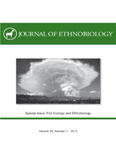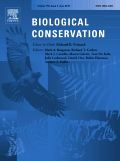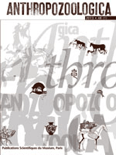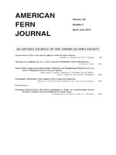
JOURNAL OF ETHNOBIOLOGY
Scope & Guideline
Innovating Insights into Cultural and Biological Diversity
Introduction
Aims and Scopes
- Ethnobotany and Traditional Knowledge:
A core focus on the study of how different cultures utilize plants for food, medicine, and rituals, emphasizing indigenous knowledge and practices. - Human-Animal Relationships:
Investigating the interactions between humans and wildlife, including the cultural significance of animals, conservation issues, and traditional ecological knowledge related to fauna. - Socioecological Dynamics:
Understanding the social and ecological relationships that shape human practices and beliefs, particularly in the context of environmental changes and sustainability. - Cultural Significance and Symbolism:
Exploring the meanings and values associated with plants and animals in various cultures, including rituals, myths, and community identity. - Environmental Justice and Ethics:
Addressing issues of equity, rights, and ethical considerations in the context of ethnobiological research, particularly concerning marginalized communities.
Trending and Emerging
- Climate Change and Adaptation:
A significant increase in research addressing the impacts of climate change on traditional ecological knowledge and practices, emphasizing how communities adapt to environmental changes. - Urban Ethnobiology:
Growing attention to the interactions between urban environments and traditional knowledge systems, exploring how urban dwellers engage with nature and utilize local biodiversity. - Integrative Approaches to Knowledge Systems:
Emerging studies focusing on integrating indigenous knowledge with scientific methodologies, fostering collaboration between different knowledge systems to address environmental issues. - Cultural Resilience and Food Sovereignty:
Heightened focus on how communities maintain cultural practices, particularly in food systems, as a means of resilience against globalization and environmental degradation. - Biocultural Conservation:
An increasing trend in research that emphasizes the intersection of biological and cultural diversity, advocating for conservation strategies that respect local knowledge and practices.
Declining or Waning
- Historical Ethnobiology:
Studies focusing on historical perspectives of ethnobiological practices have become less frequent, possibly due to a growing interest in contemporary applications and immediate ecological concerns. - Monoculture Practices:
Research centered on traditional monoculture agricultural practices has waned, as there is a noticeable shift towards exploring polyculture and agroecological strategies that emphasize biodiversity. - Static Cultural Practices:
Investigations into fixed or static cultural practices are decreasing, with more emphasis now on dynamic, adaptive practices that respond to environmental and social changes.
Similar Journals

BIOLOGICAL CONSERVATION
Fostering Innovative Solutions for Ecological Challenges.BIOLOGICAL CONSERVATION, published by Elsevier Science Ltd, is a leading international journal dedicated to advancing the science and practice of biological conservation. Since its inception in 1968, the journal has provided a critical platform for researchers, professionals, and students in the fields of Ecology, Evolution, Behavior, and Systematics as well as Nature and Landscape Conservation. With an impressive impact factor, and ranked in the Q1 category within both ecological and conservation domains in 2023, it emphasizes high-quality empirical and theoretical research essential for understanding and addressing pressing environmental challenges. Although it follows a subscription model, the journal is known for its rigorous peer-reviewed articles that contribute significantly to the field, ensuring that the latest findings and methodologies are readily accessible to practitioners. As a vital resource for those engaged in conservation efforts globally, BIOLOGICAL CONSERVATION stands out for its commitment to enhancing knowledge and informing strategies that safeguard biodiversity across ecosystems.

ANTHROPOZOOLOGICA
Innovating Perspectives on the Bonds Between SpeciesANTHROPOZOOLOGICA, published by Publications Scientifiques du Museum, Paris, is a leading journal at the intersection of anthropology and animal science. With its ISSN 0761-3032 and E-ISSN 2107-0881, this esteemed publication has established its relevance in both fields, holding a Q3 ranking in Animal Science and Zoology and a Q2 ranking in Anthropology as of 2023. The journal aims to foster interdisciplinary research by providing a platform for scholars to explore the complex relationships between humans and animals, considering ecological, cultural, and evolutionary perspectives. Over its converged years from 2011 to 2024, ANTHROPOZOOLOGICA has gained significant recognition, reflected in its Scopus rankings where it stands at #197/502 in Anthropology and #345/490 in Animal Science. While not currently open access, the journal’s rigorous editorial standards and commitment to advancing knowledge make it an invaluable resource for researchers, professionals, and students aiming to deepen their understanding of anthropozoological phenomena.

International Journal of Conservation Science
Pioneering Research for a Sustainable TomorrowThe International Journal of Conservation Science, published by the Romanian Inventors Forum, is a premier, Open Access journal dedicated to advancing the field of conservation science since its foundation in 2010. With a strong emphasis on interdisciplinary research, the journal welcomes contributions that explore innovative methodologies and sustainable practices in conservation. Based in Romania, the journal boasts an impact factor that positions it as a leading voice in its field, reflected by its Q1 ranking in Conservation and notable placements within its categories in Scopus. With coverage spanning diverse areas from natural resource management to environmental education, the journal serves as a crucial platform for researchers, policymakers, and practitioners aiming to drive impactful conservation strategies globally. The International Journal of Conservation Science not only enhances the visibility of significant research but also promotes open dialogue and collaboration among professionals committed to preserving our natural heritage.

International Journal of Gastronomy and Food Science
Innovating Culinary Studies with Rigorous Scientific DiscourseThe International Journal of Gastronomy and Food Science, published by ELSEVIER, serves as a premier platform for scholars and practitioners in the domains of gastronomy and food science. With an ISSN of 1878-450X and E-ISSN 1878-4518, this journal has been recognized for its impact, holding a prestigious Q1 ranking in Cultural Studies and a Q2 ranking in Food Science as of 2023, thereby reflecting its influence and relevance in the field. It is particularly noted for its robust Scopus rankings, placing 28th out of 1304 in Social Sciences - Cultural Studies, advocating for high-quality research with a 97th percentile ranking, and 117th in Agricultural and Biological Sciences – Food Science with a 70th percentile ranking. This open-access journal offers a comprehensive exploration of food-related issues, aiming to bridge the gap between culinary arts and scientific research, enhancing the understanding of food systems and cultural significance. For researchers, professionals, and students alike, the International Journal of Gastronomy and Food Science is an invaluable resource, dedicated to fostering innovation and comprehensive discourse in culinary studies.

Mediterranean Botany
Exploring the Richness of Mediterranean FloraMediterranean Botany is a distinguished peer-reviewed journal dedicated to the flourishing fields of Ecology, Plant Science, and Ecology, Evolution, Behavior and Systematics. Published by the Universidad Complutense de Madrid, Servicio Publicaciones, this Open Access journal has been disseminating valuable research since 2018, ensuring that findings are accessible to a global audience, with an emphasis on Mediterranean vegetation and biodiversity. With an ISSN of 2603-9109, it contributes significantly to the academic discourse in its category quartiles, recently featuring in Q3 for Ecology and related fields. Notably, Mediterranean Botany ranks within the top half of its category in Scopus, highlighting its relevance and contribution to the scientific community. Researchers, professionals, and students alike will find the journal to be a vital resource for latest discoveries, trends, and conservation strategies in Mediterranean ecosystems, positioning it as an essential platform for advancing knowledge and fostering collaboration within the plant sciences.

Nature + Culture
Exploring the Interplay of Environment and SocietyNature + Culture, published by BERGHAHN JOURNALS, focuses on the interdisciplinary exploration of cultural and environmental relationships, bridging the gap between the social sciences and ecological studies. With its ISSN 1558-6073 and E-ISSN 1558-5468, this journal has established itself as a key platform for scholars aiming to advance discussions in an era of rapid environmental change and cultural transformation. Operating from the United States, specifically at 20 Jay St, Suite 512, Brooklyn, NY 11201, it holds a respectable position within the academic community, evidenced by its Q3 ranking in Social Sciences (miscellaneous) for 2023 and its Scopus rank of #132 out of 275 in General Social Sciences. While currently not an Open Access journal, Nature + Culture provides vital insights that address the pressing issues of our time, making it an essential resource for researchers, professionals, and students committed to understanding the intersection of nature and human culture from 2008 through its converging years into 2024.

AMERICAN FERN JOURNAL
Advancing Knowledge in Ecology and Plant ScienceAMERICAN FERN JOURNAL, published by AMER FERN SOC INC, is a pivotal resource for researchers and enthusiasts in the fields of Ecology, Evolution, Behavior, and Plant Science. With a publication history dating back to 1993 and extending through 2024, this journal serves as a critical platform for the dissemination of knowledge related to ferns and lycophytes, contributing significantly to taxonomic and ecological studies. While it currently holds a Q4 rank in Ecology, Evolution, Behavior and Systematics and a Q3 rank in Plant Science, the journal continually strives to improve its relevance and impact within the scientific community. Researchers can access its valuable content through conventional subscription models, providing curated articles that advance the understanding of fern biodiversity and conservation. This journal is essential for anyone devoted to the exploration and preservation of these vital plant groups, offering insights that are not only relevant to academic circles but also inspire the broader public to appreciate the beauty and importance of ferns in our ecosystems.

Ethnobiology and Conservation
Championing Biodiversity Through EthnobiologyEthnobiology and Conservation is a pivotal academic journal published by UNIV ESTADUAL PARAIBA, EDITORA-EDUEP, dedicated to advancing the fields of ethnobiology, anthropology, ecology, and conservation science. With an ISSN of 2238-4782 and consistent publication since its inception in 2012, this journal has established itself within the academic community, achieving Q2 rankings across multiple categories including Animal Science, Anthropology, and Plant Science as of 2023. Its diverse scope seeks to bridge the gap between traditional ecological knowledge and contemporary scientific practices, making it an essential resource for researchers, professionals, and students engaged in these interdisciplinary studies. The journal's impact is underscored by its competitive Scopus rankings, including a notable percentile ranking in key scientific disciplines. By committing to open access dissemination of knowledge, Ethnobiology and Conservation plays an integral role in fostering global collaboration and understanding of biodiversity and cultural practices. Researchers and practitioners are encouraged to contribute to this vibrant academic dialogue that champions sustainable practices and the conservation of ethnobiological resources.

Journal of Ethnobiology and Ethnomedicine
Empowering Research at the Crossroads of Biology and CultureJournal of Ethnobiology and Ethnomedicine, published by BMC in the United Kingdom, is a premier open-access journal that has been at the forefront of interdisciplinary scholarship since its inception in 2005. With its focus on the intricate relationships between humans and their biological environments, the journal serves as a vital resource for researchers, professionals, and students alike. It boasts a remarkable impact, reflected in its status as a Q1 journal in prominent categories such as Agricultural and Biological Sciences, Complementary and Alternative Medicine, and Cultural Studies. The journal is indexed in Scopus, where it ranks impressively high, including a top 1% position in Cultural Studies and a notable 90th percentile ranking in Complementary and Alternative Medicine. By providing open access to insightful articles that bridge empirical research and cultural knowledge, the Journal of Ethnobiology and Ethnomedicine plays a crucial role in advancing the discourse surrounding traditional practices and their implications for health and sustainability. Join us in exploring this fascinating domain where science meets cultural wisdom.

Folklor/Edebiyat-Folklore/Literature
Connecting Disciplines: A Gateway to Folklore and Literary StudiesFolklor/Edebiyat-Folklore/Literature is an esteemed interdisciplinary journal dedicated to the exploration of folklore and literature, published by Rector CIU Cyprus International University. Established as a crucial platform for scholarly discourse, it has been an Open Access journal since 2015, empowering researchers and students from around the globe to share their findings without barriers. With its ISSN 1300-7491 and E-ISSN 2791-6057, the journal aims to bridge the gap between Anthropology, Cultural Studies, and History, as reflected in its commendable ranking in the 2023 Category Quartiles, where it holds Q3 in Anthropology and Q2 in both Cultural Studies and History. The journal is essential for anyone looking to deepen their understanding of folkloric narratives and their literary implications, contributing significantly to ongoing dialogues in these vibrant fields of study. Set in the culturally rich context of Cyprus, and operating within a converged time frame from 2018 to 2024, Folklor/Edebiyat serves as a dynamic resource for researchers, professionals, and students alike, providing access to a diverse range of scholarly articles that inspire new interpretations and discussions.